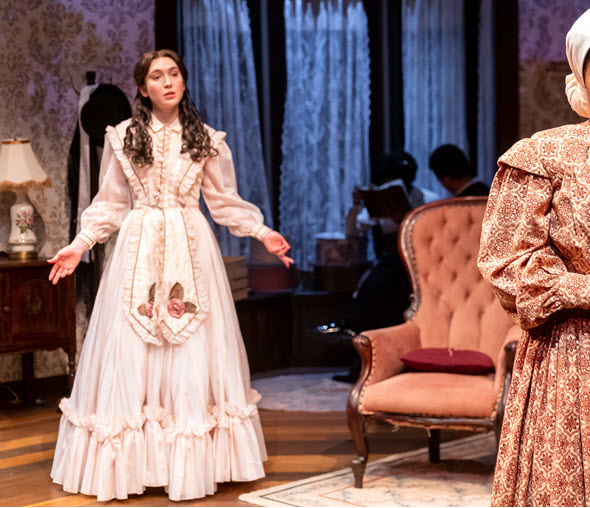At TimeLine: ‘Relentless’ measures slavery’s arc from remembered past to the ever present
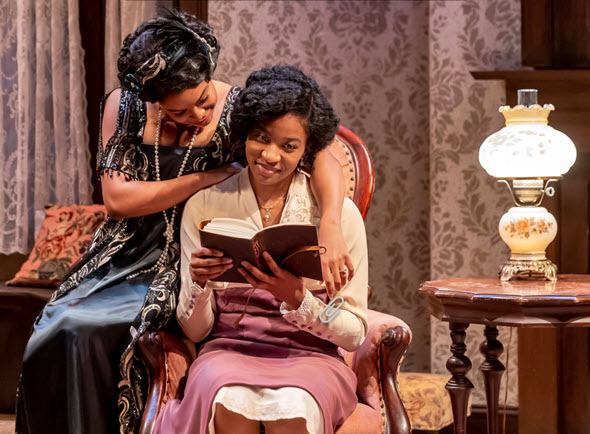
Annelle (Ayanna Bria Bakari, L) can’t keep sister Janet (Jaye Ladymore) out of their mother’s diary. (Performance photos by Brett Beiner)
Review: “Relentless” by Tyla Abercrumbie, produced by TimeLine Theatre at Theatre Wit; directed by Ron OJ Parson. Thru Feb. 26. ★★★★★
By Lawrence B. Johnson
Janet and Annelle, grown daughters of a former slave recently deceased, have traveled from Boston to their birth home in Philadephia to attend to the estate of their late mother, ‘whose remarkable history they are about to discover in an old trunk packed with her diaries. Those vivid accounts of life in the last years of slavery are matched in directness, intelligence and grace by the brilliance of the play that enfolds them, Tyla Abercrumbie’s magnificent “Relentless,” which is winding up its world premiere run at TimeLine Theatre.
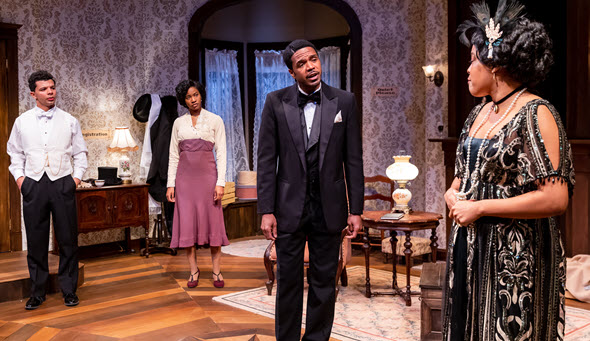
“Relentless” in the present: Franklin (Xavier Edward King, from left), Janet (Jaye Ladymore), Marcus (Travis Delgado) and Annelle (Ayanna Bria Bakari).
Watching “Relentless,” set in 1919, one might think immediately of August Wilson’s “Gem of the Ocean,” set in 1904 and playing across town at Goodman Theatre. Both resonate with the all-too-fresh legacy of slavery, though the earthy charcters in “Gem of the Ocean” are quite a different lot from the well-educated sisters and their intellectual companions in Abercrumbie’s play.
While Abercrumbie is hardly channeling Wilson, she shares both his flair for spontaneous, charged dialogue and his lyrical command of language. If “Relentless” might be called a wordy play, it is not verbose; Abercrumbie’s characters speak at purposeful length across scenes that grow ever more compelling.
“Relentless” spins its narrative through an adroit interweaving of present tense and flashbacks. The play’s title is rooted in the flashbacks, though the end comes in the shattering present. In truth, the play doesn’t end at all; it just stops, leaving breath-caught viewers to consider what they’ve seen and perhaps to see through the eyes of these likewise amazed characters.
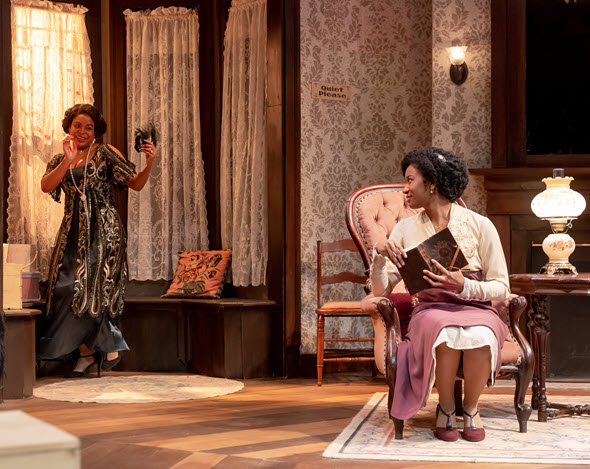
Annelle (Ayanna Bria Bakari, left), chattering and distracted, wants her sister Janet (Jaye Ladymore) to party with her – and find a man.
At the outset, it is older sister Janet (played with sober circumspection by Jaye Ladymore) who draws our focus, fascination and empathy. Janet is a nurse with a reclusive bent but also a streak of curiosity. She finds the diaries and begins reading – to the dismay of her sister Annelle, a young woman as outgoing and endlessly chatty as Janet is private and reticent. Annelle is abhorred by the idea of reading someone else’s private musings, even if the person who wrote them has died. She prods and pushes Janet to go out on the town with her, have some fun and some laughs, maybe meet a guy. Annelle is married; Janet should find a husband, too.
Nattering Annelle is quite a piece of dramatic work, which is to say not at all who or what she appears to be. She is the essential tour de force of Abercrumbie’s play, and she’s made annoyingly – then stunningly – authentic by Ayanna Bria Bakari in a measured performance that slowly reveals the depth and complexity of this young woman’s distress. Bakari delivers a raw portrait of disintegration.
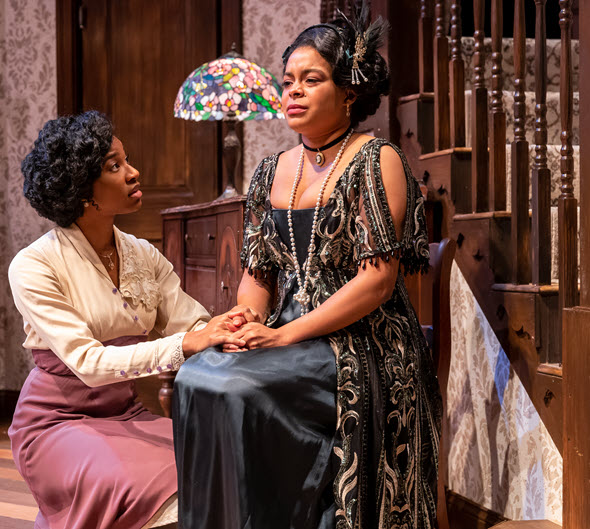
Annelle Ayanna Bria Bakari) is disturbed, and sister Janet (Jaye Ladymore) digging into their mother’s past is only the half of it.
Bookish Janet does find a man, or rather he shows up at her front door, a bottle of Bordeaux wine in hand, steered to this address by matchmaking Annelle. Franklin actually owns the French winery whose product he now brandishes. He is Black, top-hatted, debonaire, and he sweeps into Janet’s parlor with the confidence of a man accustomed to going about as he wishes. Xavier Edward King indeed cuts an elegant figure as the worldly Franklin, who perhaps expects to sweep Janet off her feet but finds in her a wit the equal of his. What plays out in their jousting banter is Shakespeare’s Beatrice and Benedick redux, remounted and back in the lists.

Understudy Sierra Coachman: credible and affecting as the girls’ mother, Zhuukee, when she was a young slave.
Whereas Franklin’s wealth has precipitated from a series of lucky turns, Annelle’s husband Marcus is a self-made man, a doctor who adores his increasingly difficult wife. He wants to have children; she shrinks from the very thought. Travis Delgado lends the physician the dignity and gravity of a man who sees the world through a clear lens, in practical terms.
The flashbacks, which come via the diaries, toss us back to the 1860s and into the slavery of the sisters’ mother, named Zhuukee by her own mother but called Annabelle Lee, after Poe’s character, by the girl who owns her and also loves her.
The white girl is Mary Anna Elizabeth, whose father gave her the Black girl as a gift. In a series of tableaux, we watch them grow up as companions, a surreal drama within the larger play. One moment, the privileged Mary Anna (Rebecca Hurd, overlaying desperate need with radiance) ardently protests her love for Zhuukee, but in the next instant threatens a whipping. At the performance I saw, understudy Sierra Coachman imbued Zhuukee with a credible and affecting mix of ineluctable submission and wise patience.
Ultimately, the play addresses its title. What is relentless? Perhaps it is the dauntless will of these souls to prevail. Zhuukee overcame, did she not? And now, half a century on, freedom has brought four fortunates together in a very nice home (set designer Jack Magaw’s handiwork); and even the troubled Annelle may have found peace. Surely, God’s in his heaven, and all’s right with the world. Then heaven cracks.


